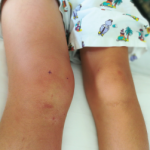NEW YORK (Reuters Health)—For young people with juvenile idiopathic arthritis (JIA) who don’t achieve disease control, switching to a different class of biologic is unlikely to be beneficial, researchers say. The observational study yielded no evidence to support or refute the 2015 National Health Service England guidelines, which recommend switching most patients to a second…

Pediatric Cases Require Special Considerations & Aggressive Treatment Plans
ATLANTA—Managing pediatric patients with rheumatic disease involves special considerations, such as developmental concerns and physiological traits that may affect dosing of medications, according to two experts. During a session at the 2019 ACR/ARP Annual Meeting, Courtney Kremer, ARNP, a pediatric nurse practitioner at the University of Iowa Stead Family Children’s Hospital, Iowa City, and Jessica…
A More Complicated Pregnancy: Inflammatory Arthritis Increases the Risk for Adverse Outcomes
Pregnant women with inflammatory arthritis may have an increased risk for preterm delivery. New research examined the risk of preterm delivery and other pregnancy complications in women with RA and JIA vs. healthy controls…

Adalimumab for JIA-Associated Uveitis: 5-Year Follow-up
A five-year study in patients with juvenile idiopathic arthritis-associated uveitis found drug-induced disease remission did not persist once adalimumab was stopped after long-term treatment.
Shared Decision Making, Good Disease Control Are Key Components of JIA Management
A group led by Sarah Ringold, MD, MS, assistant professor of rheumatology at Seattle Children’s Hospital, has developed a new guideline intended to provide recommendations for the treatment and monitoring of children with juvenile idiopathic arthritis (JIA) manifesting as non-systemic polyarthritis, sacroiliitis or enthesitis.1,2 Key Updates The new recommendations appear in both Arthritis & Rheumatology…

New Guideline Recommends Frequent Monitoring & Collaboration for JIA-Associated Uveitis Management
As soon as pediatric patients are diagnosed with juvenile idiopathic arthritis (JIA), they should also be screened for uveitis, says ophthalmologist Gary Holland, MD. Otherwise, the University of California, Los Angeles, provider says, “Kids who are diagnosed with JIA may not come to an ophthalmologist until they have vision-limiting complications.” Uveitis is the most common…

Long-Term Canakinumab Treatment Has Favorable Effect on Systemic Features & Joint Health for sJIA
During a five-year trial of canakinumab, patients with systemic juvenile idiopathic arthritis taking canakinumab showed progress toward clinical remission and glucocorticoid tapering…
Clinical Remission Should Be Target of JIA Treatment: Task Force
NEW YORK (Reuters Health)—An international task force says patients with juvenile idiopathic arthritis (JIA) should be treated to a target of clinical remission, among other new recommendations. “The Task Force is convinced that transferring (the recommendations) into clinical practice will significantly improve the outcomes in patients with JIA,” Dr. Angelo Ravelli of the Istituto G….
TNF Inhibitors May Not Be Linked to Cancer Risk in Kids
NEW YORK (Reuters Health)—Using tumor necrosis factor (TNF) inhibitors in children is not significantly associated with cancer risk, according to a new study. “TNF inhibitors are remarkably effective for the treatment of many autoimmune conditions, but physicians worry that they cause cancer,” Dr. Timothy Beukelman from the University of Alabama in Birmingham told Reuters Health…

Year in Review: Expert Covers 2017’s Key Clinical Findings
In a Year in Review session at the 2017 ACR/ARHP Annual Meeting, Daniel Solomon, MD, MPH, highlighted the latest and most intriguing aspects of clinical research on rheumatic diseases from 2017. His discussion touched on medical therapy, genetics, the effects of bariatric surgery and diet, cancer risk and more…